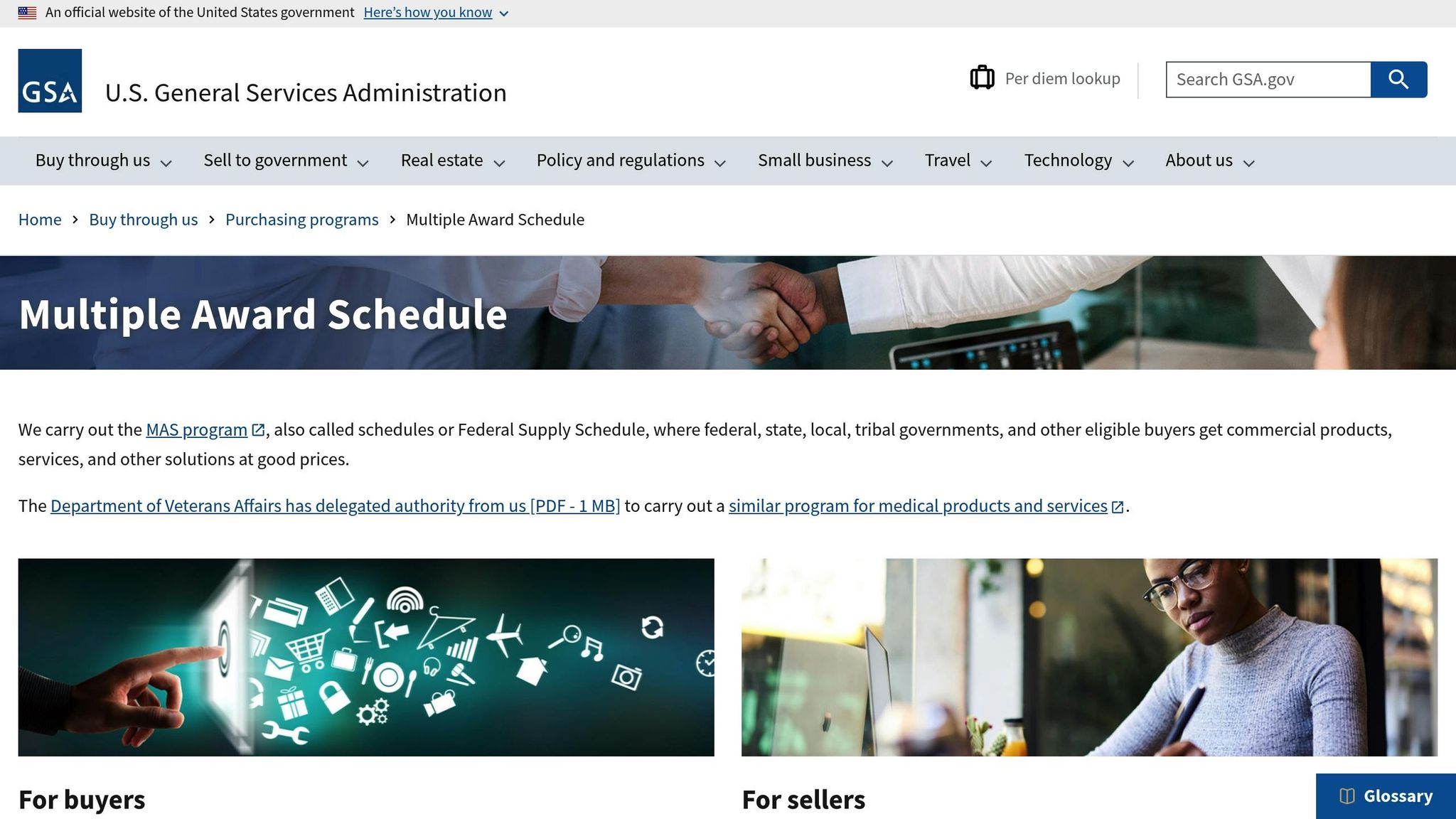Federal contracts offer small businesses steady revenue and less competition compared to the commercial market. In 2023, $45 billion was spent through GSA Schedules, yet only 4% of small businesses participate. Key benefits include:
- Consistent Demand: Government spending remains stable, even during economic downturns.
- Less Competition: 44% of federal awards receive only one bid.
- High-Value Contracts: Federal deals often surpass commercial contracts in value.
The GSA Multiple Award Schedule (MAS) program simplifies federal procurement into 12 categories, like IT, Professional Services, and Security. Small businesses can thrive by aligning their expertise with these categories and following steps like SAM registration, proposal development, and targeted marketing.
Quick Facts:
- GSA Awards exceed $160 million daily.
- Small businesses in the program report an average revenue boost of $927,000.
- Federal priorities include IT modernization, cybersecurity, and domestic supply chain support.
Want to secure federal contracts? Start by assessing eligibility, preparing documentation, and focusing on categories that match your strengths.
GSA Multiple Award Schedule (MAS) Basics

GSA MAS Program Overview
The GSA Multiple Award Schedule (MAS) program is the federal government’s go-to system for purchasing commercial products and services. It handles billions in federal spending annually, offering lucrative opportunities for contractors. With streamlined processes, it connects federal agencies to preapproved vendors. Contractors who qualify gain access to exclusive procurement tools like GSA eBuy and GSA Advantage, making it easier to secure federal contracts. The program is further broken down into specialized categories for better organization.
12 Large Categories Structure
The GSA MAS program divides procurement opportunities into 12 Large Categories, each with its own subcategories and Special Item Numbers (SINs). This structure simplifies the search process for federal agencies and helps contractors position their offerings effectively. By creating well-defined niches, the program also opens doors for small businesses to thrive in specific areas.
Small Business Advantages in GSA MAS
Small businesses in the GSA MAS program benefit in several ways:
- Steady Revenue: Federal spending remains consistent, even during economic downturns.
- Exclusive Access: Tools like GSA eBuy and GSA Advantage provide direct entry to opportunities.
- Competitive Edge: Access to high-value contracts with less competition compared to the commercial market.
Josh Ladick, Founder of GSA Focus, puts it plainly:
"Every day you’re not on GSA, you’re missing out on $50m+ in opportunities."
In addition, federal contracts often outshine commercial deals in value. GSA Awards alone surpass $160 million daily.
GSA MAS Large Categories Guide
12 Categories Overview
The GSA Multiple Award Schedule (MAS) program organizes federal procurement into twelve Large Categories, each offering opportunities for small businesses. Here’s a quick look at these categories:
| Large Category | Key Products & Services |
|---|---|
| Facilities | Building maintenance, cleaning supplies, HVAC systems |
| Furniture & Furnishings | Office furniture, household furnishings, workspace solutions |
| Human Capital | Training services, HR support, workforce development |
| Industrial Products & Services | Manufacturing equipment, tools, safety supplies |
| Information Technology | Hardware, software, IT services, cybersecurity |
| Office Management | Office supplies, printing services, administrative support |
| Professional Services | Consulting, engineering, technical services |
| Scientific Management | Laboratory equipment, research tools, testing services |
| Security & Protection | Security systems, protective equipment, facility security |
| Transportation & Logistics | Fleet management, shipping services, warehousing |
| Travel | Travel management, lodging, transportation services |
| Miscellaneous | Products and services not covered in other categories |
This structure simplifies federal procurement and highlights areas where small businesses can thrive.
Sales Potential by Category
Each category offers unique sales potential, driven by federal priorities and spending patterns:
- Information Technology: With the government prioritizing IT modernization and cybersecurity, this category stands out. The billions spent daily on IT needs make it a lucrative space for vendors.
- Professional Services: Federal agencies are increasing investments in consulting, engineering, and technical support. This category continues to grow, creating room for businesses to secure contracts.
- Industrial Products & Services: Efforts to strengthen domestic supply chains have opened new opportunities. In 2023 alone, this category accounted for $45 billion in GSA Schedule funding.
- Security & Protection: Spending in this area has surged, with 44% of government awards receiving just one bid. For small businesses, this means less competition and higher chances of winning contracts.
Surprisingly, only 4% of small businesses hold GSA Schedules, yet those that do often see substantial revenue growth. For instance, some small business clients have reported an average increase of $927,000 in revenue after securing these contracts.
Small businesses should focus on categories that align with their expertise and meet GSA’s requirements to maximize opportunities.
Small Business Success Steps in GSA MAS
GSA Schedule Application Steps
Getting a GSA Schedule contract involves several key steps that require time and attention:
- SAM Registration: Register your business on SAM.gov, ensuring your NAICS codes and business details are accurate.
- Documentation Preparation: Gather essential records like performance history, financial statements, and pricing information.
- Proposal Development: Draft a detailed proposal that meets GSA’s specific requirements.
This process can take over 100 hours to complete.
| Challenge | Impact | Suggested Approach |
|---|---|---|
| Complex Documentation | Requires over 100 hours | Seek expert guidance |
| Frequent Form Updates | May delay applications | Stay updated on GSA changes |
| Compliance Issues | Risk of rejection | Conduct thorough document checks |
Once your application is approved, the next step is to market your schedule effectively to federal agencies.
Federal Agency Marketing Guide
After securing your GSA Schedule, proactive marketing is crucial to winning contracts:
- Target Agency Research
Study spending trends and identify agencies that align with your offerings. With $45 billion channeled through GSA Schedules in 2023, focusing on the right agencies can make a big difference. - Proposal Development
Craft responses to RFQs that emphasize your strengths. Since 44% of government awards receive just one bid, a well-prepared proposal can significantly boost your chances. - Relationship Building
Build connections with agency contracting officers to establish trust and open doors to opportunities.
Contract Management Requirements
Once you’ve secured contracts, managing them effectively is critical to long-term success:
Price Management
- Conduct regular market research.
- Maintain competitive pricing.
- Follow GSA pricing guidelines.
Performance Monitoring
- Track deliverables and deadlines.
- Ensure quality standards are met.
- Document your performance for future opportunities.
Compliance Maintenance
- Update your documentation regularly.
- Stay informed about regulation changes.
- Perform internal audits to avoid compliance issues.
Strong contract management ensures steady revenue and keeps you compliant with GSA standards. If these tasks feel overwhelming, professional services can help you handle the complexities, allowing you to focus on growing your business and serving your clients.
sbb-itb-8737801
GSA Schedules and the Utilization of Small Business
Federal Spending Trends and Priorities
Federal spending trends continue to create niche opportunities for small businesses, opening doors for growth and expansion.
Green Products and Services
Federal agencies are increasingly prioritizing environmentally friendly products and services. This shift creates opportunities for small businesses offering energy-efficient technology, sustainable materials, waste reduction solutions, or renewable energy services. Businesses that incorporate green practices into their operations and secure environmental certifications can stand out in their GSA Schedule proposals. These changes also pave the way for advancements in federal IT and supply chain systems.
IT Security and Modernization
The federal government’s focus on cybersecurity and IT modernization is creating new opportunities for small businesses. With billions set aside for digital transformation, agencies are actively seeking solutions to modernize IT systems, strengthen network security, and replace outdated infrastructure. Small businesses with expertise in these areas – and strong security credentials – are well-positioned to meet this demand. Additionally, federal efforts to strengthen domestic supply chains provide even more avenues for small businesses to contribute.
U.S. Supply Chain Focus
Strengthening domestic supply chains has become a key federal priority, generating fresh contract opportunities for U.S.-based small businesses. By emphasizing domestic manufacturing, critical supply chain roles, and high-quality standards, small businesses can align with the government’s Made in America requirements. This focus not only creates a more favorable market but also enhances the appeal of participating in GSA Schedules for businesses meeting these criteria.
Conclusion
The GSA Multiple Award Schedule (MAS) program provides small businesses with access to steady, long-term federal contracts. In 2023 alone, approximately $45 billion was spent through GSA Schedule contracts, highlighting the potential for reliable revenue in the federal marketplace.
Federal contracting offers distinct advantages for small businesses. For example, nearly 44% of government awards receive only one bid, reflecting relatively low competition. Additionally, federal contracts often surpass commercial contracts in value and provide consistent demand, even during economic downturns, thanks to stable government spending.
To capitalize on these opportunities, small businesses need a clear strategy. This includes assessing GSA Schedule eligibility, ensuring compliance with federal regulations, identifying target agencies, and seeking professional guidance during the application process.
With federal priorities focused on domestic supply chains, IT advancements, and sustainability, the GSA MAS program simplifies procurement, creating favorable conditions for small businesses to thrive. These steps align seamlessly with the strategies and insights covered earlier.
Use this knowledge to position your business for success in federal contracting through the GSA Schedule program.
FAQs
What steps does a small business need to take to qualify for the GSA Multiple Award Schedule (MAS) program?
To qualify for the GSA Multiple Award Schedule (MAS) program, small businesses must meet specific eligibility requirements and complete several key steps. These include preparing the necessary documentation, ensuring compliance with GSA regulations, and successfully navigating the application and negotiation process.
For small businesses seeking guidance, professional services can simplify the process by handling tasks like document preparation, compliance assurance, and contract negotiation. This support can save time and help businesses unlock federal contracting opportunities more efficiently.
What are the best ways for small businesses to market their services to federal agencies after getting a GSA Schedule contract?
After securing a GSA Schedule contract, small businesses can effectively market their services to federal agencies by focusing on a few key strategies:
- Targeted outreach: Identify federal buyers who frequently purchase services in your category and reach out with tailored marketing materials.
- Proposal management: Develop strong, competitive proposals to respond to federal opportunities and manage them through a structured pipeline.
- Relationship building: Attend federal contracting events, network with agency representatives, and establish connections to build trust and visibility.
By staying proactive and leveraging these strategies, small businesses can maximize their federal sales opportunities and grow their presence in the government marketplace.
What unique benefits do small businesses gain from federal contracting compared to the commercial market?
Small businesses enjoy several distinct advantages in federal contracting that may not be as readily available in the commercial market. For instance, the federal government sets aside a significant portion of its contracts specifically for small businesses, ensuring they have a fair chance to compete. These set-asides include programs for women-owned, veteran-owned, and disadvantaged small businesses.
Additionally, federal contracts often provide more stability and long-term opportunities compared to the commercial market, as government agencies typically require ongoing goods and services. This can lead to consistent revenue streams and opportunities to scale operations. Lastly, federal spending trends, such as the expected growth in GSA sales, create a wide range of sales opportunities across various sectors, offering small businesses access to a large and reliable customer base.
Related posts
- Ultimate Guide to Federal Subcontracting Strategies
- 11 Features of GSA Schedules That Drive Success
- Top 7 GSA Schedule Benefits for Small Businesses
- How to Access GSA Small Business Support Programs



